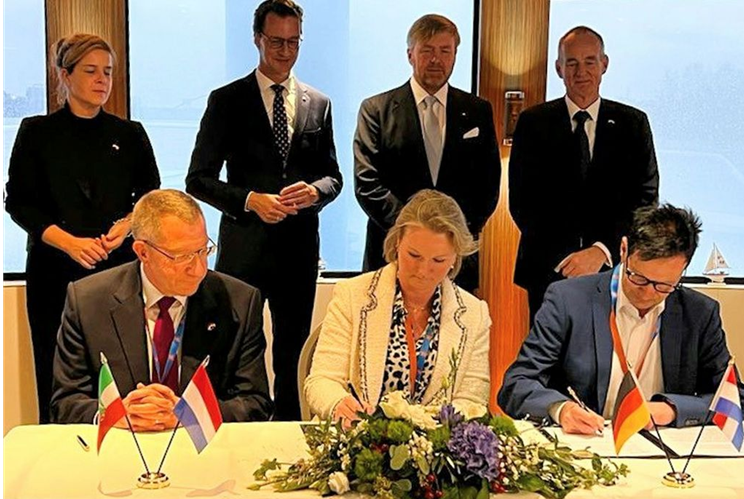
- Strategic opportunities for the Netherlands as an importer, producer of hydrogen and as a gateway to Germany
- Gasunie subsidiary Hynetwork Services signs cooperation agreement with Open Grid Europe and Thyssengas on connecting national hydrogen networks between the Netherlands and Germany
- Cross-border hydrogen infrastructure between the Netherlands and Germany crucial for sustainable northwest European industry
- Market parties say acceleration of inter-European corridor, like the Delta Rhine Corridor, for hydrogen essential
Market parties and transmission system operators from the Netherlands and Germany want accelerated cross-border hydrogen infrastructure to connect Dutch hydrogen production and import with German industry. To reinforce its importance, Dutch and German infrastructure companies, energy companies and governments today signed agreements in Duisburg on developing a hydrogen corridor between the Netherlands and Germany and its use.
The signings took place during King Willem-Alexander’s visit to several hydrogen projects in Germany’s North Rhine-Westphalia. Parallel to the King’s working visit, some 40 Dutch companies took part in a hydrogen economic mission led by State Secretary for Economic Affairs Hans Vijlbrief.
Agreements on cross-border hydrogen network to make German industry more sustainable
Under the watchful eye of King Willem-Alexander, Dutch Gasunie subsidiary Hynetwork Services and German transmission system operators Open Grid Europe and Thyssengas signed a cooperation agreement on the connection of the national hydrogen networks between the Netherlands and Germany. At the subsequently organised ‘H2 Connect event’, six energy companies, bp, Uniper, E. ON/Essent, Onyx Power, Equinor and ENGIE, signed a Memorandum of Understanding in which they expressed their intention to transport hydrogen via the Netherlands to (industrial) customers in Germany, including North Rhine-Westphalia. Moreover, German energy company EnBW and Rotterdam’s import terminal ACE Terminal there announced plans to cooperate to supply hydrogen from ACE Terminal’s planned facilities at the Port of Rotterdam to German end-users.
Dutch energy hub
The Netherlands is seen as a frontrunner in the renewable hydrogen transition and has ambitions to play an important role both as an importer, producer and exporter of hydrogen. Hydrogen plays a crucial role in the energy transition, for instance in the industry and transport sectors. This requires large volumes of hydrogen in both the Netherlands and Germany. The state of North Rhine-Westphalia wants to use hydrogen to develop a climate-neutral industrial region. Using hydrogen, the German state aims to reduce CO2 emissions by 25%, with about 70% reliance on hydrogen imports. A reliable supply of hydrogen at competitive prices is therefore needed.
For the Netherlands, this offers strategic opportunities to become an energy hub for hydrogen to Germany. The timely availability of cross-border transport and storage infrastructure is essential here and could form the basis of a future European hydrogen market. The Netherlands and Germany are working together on a crossborder hydrogen chain. The neighbouring countries are jointly building production and import capacity, infrastructure and additional hydrogen knowledge.
Read the most up to date Fuel Cell and Hydrogen Industry news at FuelCellsWorks




